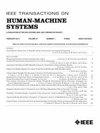Adaptive Virtual Fixture Based on Learning Trajectory Distribution for Comanipulation Tasks
IF 4.4
3区 计算机科学
Q2 COMPUTER SCIENCE, ARTIFICIAL INTELLIGENCE
引用次数: 0
Abstract
Virtual fixture is a powerful tool to improve safety and efficiency for co-manipulation tasks. However, traditional virtual fixtures with constant stiffness are inadequate for scenarios where robots need to leave the constraints to perform tasks. To address this, we propose an adaptive virtual fixture based on the motion refinement tube, which dynamically adjusts the guiding force according to the distribution of trajectories. To prevent tube deformation in the Cartesian space due to the neglect of off-diagonal elements of covariance matrices, the refinement tube radii and nonlinear stiffness terms are computed in local coordinate systems based on the decomposed covariance matrix. An energy-tank-based passivity controller is designed to ensure system stability when employing the virtual fixture with state-dependent stiffness terms. In the validation tests with 18 participants, the proposed method showed improvements in task efficiency (18.69% increase) and collision avoidance (97.87% reduction) for a typical pick-and-place task with scattered materials. It also provided better subjective experiences of the users than traditional virtual fixtures. Meanwhile, compared with the method that neglects off-diagonal elements of the covariance matrix, the proposed method exhibited a 4.28% efficiency improvement and a 40.42% decrease in collision occurrences.基于学习轨迹分布的协同操作任务自适应虚拟夹具
虚拟夹具是提高协同操作任务安全性和效率的有力工具。然而,传统的具有恒定刚度的虚拟夹具不适合机器人需要离开约束来执行任务的场景。为了解决这个问题,我们提出了一种基于运动细化管的自适应虚拟夹具,它可以根据轨迹分布动态调整导向力。为了防止因协方差矩阵的非对角元素被忽略而导致管材在笛卡尔空间中变形,基于分解后的协方差矩阵,在局部坐标系中计算细化管材半径和非线性刚度项。设计了一种基于能量罐的无源控制器,以保证系统在使用状态相关刚度项的虚拟夹具时的稳定性。在18人的验证测试中,对于典型的材料分散拾取任务,该方法的任务效率提高了18.69%,避免碰撞的效率降低了97.87%。它还为用户提供了比传统虚拟设备更好的主观体验。同时,与忽略协方差矩阵非对角元素的方法相比,该方法的效率提高了4.28%,碰撞次数减少了40.42%。
本文章由计算机程序翻译,如有差异,请以英文原文为准。
求助全文
约1分钟内获得全文
求助全文
来源期刊

IEEE Transactions on Human-Machine Systems
COMPUTER SCIENCE, ARTIFICIAL INTELLIGENCE-COMPUTER SCIENCE, CYBERNETICS
CiteScore
7.10
自引率
11.10%
发文量
136
期刊介绍:
The scope of the IEEE Transactions on Human-Machine Systems includes the fields of human machine systems. It covers human systems and human organizational interactions including cognitive ergonomics, system test and evaluation, and human information processing concerns in systems and organizations.
 求助内容:
求助内容: 应助结果提醒方式:
应助结果提醒方式:


